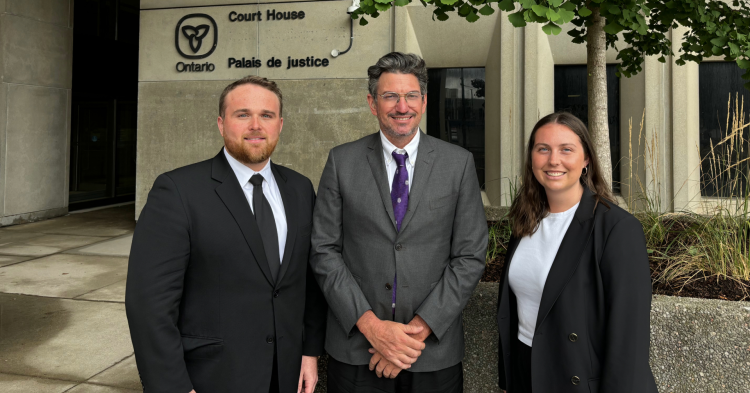A new initiative of Western Law's Community Legal Services is broadening access to justice in London, Ont. while helping to reduce the administrative burden on the local court system.
The Court Assistance Program, staffed this summer by 12 law students and two articling students under the supervision of family lawyer and review counsel Greg Parrack, provides free legal information and support to self-represented individuals navigating the Superior Court of Justice Family Court. Students enrolled in Community Legal Services' clinical courses - introduction to clinical law and advanced family clinical law - will continue the work throughout the academic year.

Through the generous support of the Law Foundation of Ontario, the newly created Court Assistance Program significantly expands the service delivery of Community Legal Services. The program is hoped to provide brief legal services to over 500 individuals in the family court system annually, in addition to the clinic's existing case load of approximately 135 clients per year.
"The Court Assistance Program is a perfect example of how Western Law can serve our community while preparing our students to lead in the profession." - Mohamed F. Khimji, Faculty of Law dean
"By supporting people who are navigating the family justice system on their own, we're not only expanding access to justice, we're also giving our students invaluable, hands-on experience in the courtroom. It's an initiative that strengthens the courts, uplifts our community and shapes the next generation of lawyers," Khimji added.
Access to justice for self-represented individuals
According to 2021 data from the Canadian Centre for Justice and Community Safety Statistics, a majority of litigants (58 per cent) and respondents (70 per cent) in family cases are self-represented.
The Court Assistance Program directly addresses these critical gaps in access to justice by offering legal guidance that empowers individuals to make informed decisions for their families. Community Legal Services student caseworkers maintain a regular presence at the London courthouse to promote and deliver the program and will soon operate from a satellite office on site.
The caseworkers provide in-person and virtual services that aim to simplify complex processes for users and help them prepare appropriately for family law matters. These services include providing information related to making claims, assisting with form completion, supporting users in court for motions and adjournments and, when needed, speaking on their behalf.
Reducing backlogs at the Superior Court of Justice
Beyond the direct benefits to self-represented individuals, the program is helping to create efficiencies in the local family justice system by aiding user readiness.
Without legal representation, individuals in the court system may unintentionally delay proceedings by misunderstanding processes, not completing appropriate forms or asking questions of the judges. The Court Assistance Program helps users to fill these knowledge gaps and is garnering appreciation from local judges for expediting often drawn-out court processes.
"The Community Legal Services clinic at Western Law, under the direction of Mr. Greg Parrack, has been of considerable help to the Superior Court of Justice Family Court at London. The benefits to the court, from the involvement of the clinic, include allowing cases to be considered more efficiently and allow parties to feel confident that their case is being handled properly and in their best interests," said Local Administrative Judge Justice B. Tobin.
"The work undertaken by the clinic often results in a durable resolution that is acceptable to all. The judges of the court wholeheartedly endorse the involvement of the clinic as a valued part of the family justice system."
'Unmatched' legal experience
The addition of the Court Assistance Program to Community Legal Services has been equally advantageous to student caseworkers who are benefitting from the opportunity to spend more time gaining hands-on legal experience in court.
"I'm getting unmatched experience in my 1L summer. I'm exposed to valuable networking opportunities working with judges and local lawyers, which helps to build a name in the community," said caseworker and law student Zak Schopp.
"The experience has allowed me to see the distinction between practice and academia. Building court litigation experience helps you understand what it would be like as a litigator and apply law and procedures in real time."
The program has also proved to be deeply rewarding for students, allowing them to understand the real-world impact of their advocacy on community members dealing with complex legal issues.
"It's a great opportunity to help people who can't afford legal representation, and it's making a big difference," said caseworker and law student Adelaide McIntyre. "Everyone seems to be very grateful for the help. These people are going through a hard time, and we walk away feeling like we've made a positive impact."
Individuals seeking support from the Court Assistance Program can email clscap@uwo.ca or call 519-661-3352 for more information.











